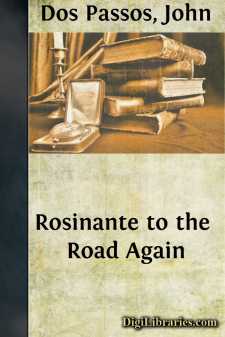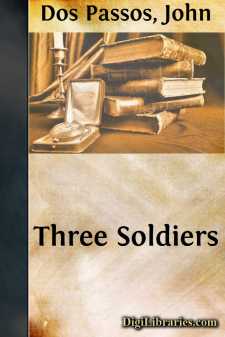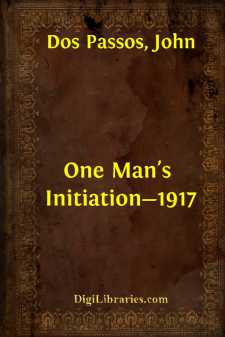Categories
- Antiques & Collectibles 13
- Architecture 36
- Art 48
- Bibles 22
- Biography & Autobiography 813
- Body, Mind & Spirit 142
- Business & Economics 28
- Children's Books 15
- Children's Fiction 12
- Computers 4
- Cooking 94
- Crafts & Hobbies 4
- Drama 346
- Education 46
- Family & Relationships 57
- Fiction 11829
- Games 19
- Gardening 17
- Health & Fitness 34
- History 1377
- House & Home 1
- Humor 147
- Juvenile Fiction 1873
- Juvenile Nonfiction 202
- Language Arts & Disciplines 88
- Law 16
- Literary Collections 686
- Literary Criticism 179
- Mathematics 13
- Medical 41
- Music 40
- Nature 179
- Non-Classifiable 1768
- Performing Arts 7
- Periodicals 1453
- Philosophy 64
- Photography 2
- Poetry 896
- Political Science 203
- Psychology 42
- Reference 154
- Religion 513
- Science 126
- Self-Help 84
- Social Science 81
- Sports & Recreation 34
- Study Aids 3
- Technology & Engineering 59
- Transportation 23
- Travel 463
- True Crime 29
Rosinante to the Road Again
by: John Dos Passos
Categories:
Description:
Excerpt
I: A Gesture and a Quest
Telemachus had wandered so far in search of his father he had quite forgotten what he was looking for. He sat on a yellow plush bench in the café El Oro del Rhin, Plaza Santa Ana, Madrid, swabbing up with a bit of bread the last smudges of brown sauce off a plate of which the edges were piled with the dismembered skeleton of a pigeon. Opposite his plate was a similar plate his companion had already polished. Telemachus put the last piece of bread into his mouth, drank down a glass of beer at one spasmodic gulp, sighed, leaned across the table and said:
"I wonder why I'm here."
"Why anywhere else than here?" said Lyaeus, a young man with hollow cheeks and slow-moving hands, about whose mouth a faint pained smile was continually hovering, and he too drank down his beer.
At the end of a perspective of white marble tables, faces thrust forward over yellow plush cushions under twining veils of tobacco smoke, four German women on a little dais were playing Tannhauser. Smells of beer, sawdust, shrimps, roast pigeon.
"Do you know Jorge Manrique? That's one reason, Tel," the other man continued slowly. With one hand he gestured to the waiter for more beer, the other he waved across his face as if to brush away the music; then he recited, pronouncing the words haltingly:
'Recuerde el alma dormida,
Avive el seso y despierte
Contemplando
Cómo se pasa la vida,
Cómo se viene la muerte
Tan callando:
Cuán presto se va el placer,
Cómo después de acordado
Da dolor,
Cómo a nuestro parecer
Cualquier tiempo pasado
Fué mejor.'
"It's always death," said Telemachus, "but we must go on."
It had been raining. Lights rippled red and orange and yellow and green on the clean paving-stones. A cold wind off the Sierra shrilled through clattering streets. As they walked, the other man was telling how this Castilian nobleman, courtier, man-at-arms, had shut himself up when his father, the Master of Santiago, died and had written this poem, created this tremendous rhythm of death sweeping like a wind over the world. He had never written anything else. They thought of him in the court of his great dust-colored mansion at Ocaña, where the broad eaves were full of a cooing of pigeons and the wide halls had dark rafters painted with arabesques in vermilion, in a suit of black velvet, writing at a table under a lemon tree. Down the sun-scarred street, in the cathedral that was building in those days, full of a smell of scaffolding and stone dust, there must have stood a tremendous catafalque where lay with his arms around him the Master of Santiago; in the carved seats of the choirs the stout canons intoned an endless growling litany; at the sacristy door, the flare of the candles flashing occasionally on the jewels of his mitre, the bishop fingered his crosier restlessly, asking his favorite choir-boy from time to time why Don Jorge had not arrived. And messengers must have come running to Don Jorge, telling him the service was on the point of beginning, and he must have waved them away with a grave gesture of a long white hand, while in his mind the distant sound of chanting, the jingle of the silver bit of his roan horse stamping nervously where he was tied to a twined Moorish column, memories of cavalcades filing with braying of trumpets and flutter of crimson damask into conquered towns, of court ladies dancing, and the noise of pigeons in the eaves, drew together like strings plucked in succession on a guitar into a great wave of rhythm in which his life was sucked away into this one poem in praise of death....




